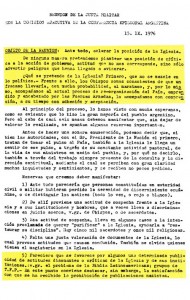The Pope and the Argentine Junta

First page of the report on a meeting between Argentine bishops and the military Junta, in September 1976. See the rest of the documentation at iglesiaydictadura.wordpress.com
Andrew Sullivan points to, and comments on, one of the more detailed and complex accounts of the precise relationship between the freshly appointed Pope Francis I and the Argentine military junta, provided by Democracy Now´s Amy Goodman in an interview with journalist Horacio Verbitsky. This is Sullivan; the quotes are from Goodman’s interview with Verbitsky:
One version of the story has it that Bergoglio intervened to save two radical lefty Jesuit priests, who were kidnapped by the junta and eventually found, drugged, tortured and terrorized. Another version is that Bergoglio basically sold them out as radicals to the junta. In a must-read interview with Horacio Verbitsky, he finds a way to reconcile the two accounts:
During the research for one of my books, I found documents in the archive of the foreign relations minister in Argentina, which, from my understanding, gave an end to the debate and show the double standard that Bergoglio used. The first document is a note in which Bergoglio asked the ministry to—the renewal of the passport of one of these two Jesuits that, after his releasing, was living in Germany, asking that the passport was renewed without necessity of this priest coming back to Argentina.
The second document is a note from the officer that received the petition recommending to his superior, the minister, the refusal of the renewal of the passport.
And the third document is a note from the same officer telling that these priests have links with subversion—that was the name that the military gave to all the people involved in opposition to the government, political or armed opposition to the military—and that he was jailed in the mechanics school of the navy, and saying that this information was provided to the officer by Father Jorge Mario Bergoglio, provincial superior of the Jesuit company. This means, to my understanding, a double standard. He asked the passport given to the priest in a formal note with his signature, but under the table he said the opposite and repeated the accusations that produced the kidnapping of these priests.
Read the whole thing. It exonerates Bergoglio in some ways but it’s very depressing over all. One of the two tortured priests told Verbitsky he suspected that Bergoglio had actually been directly involved in the torture and interrogations – because they involved theological questions of some erudition:
Verbitsky: They were tortured. They were interrogated. One of the interrogators had externally knowings [sic] about theological questions, that induced one of them, Orlando Yorio, to think that their own provincial, Bergoglio, had been involved in this interrogatory.
Amy Goodman: He said that—he said that Bergoglio himself had been part of the—his own interrogation, this Jesuit priest?
Verbitsky: He told me that he had the impression their own provincial, Bergoglio, was present during the interrogatory, which one of the interrogators had externally knowledge of theological questions.
My italics. If the new Pope was present during the torture and interrogation of a Jesuit dissident, then we have just returned to the days of the Inquisition. I pray to God this isn’t true.
View or read the whole interview at Democracy Now!












